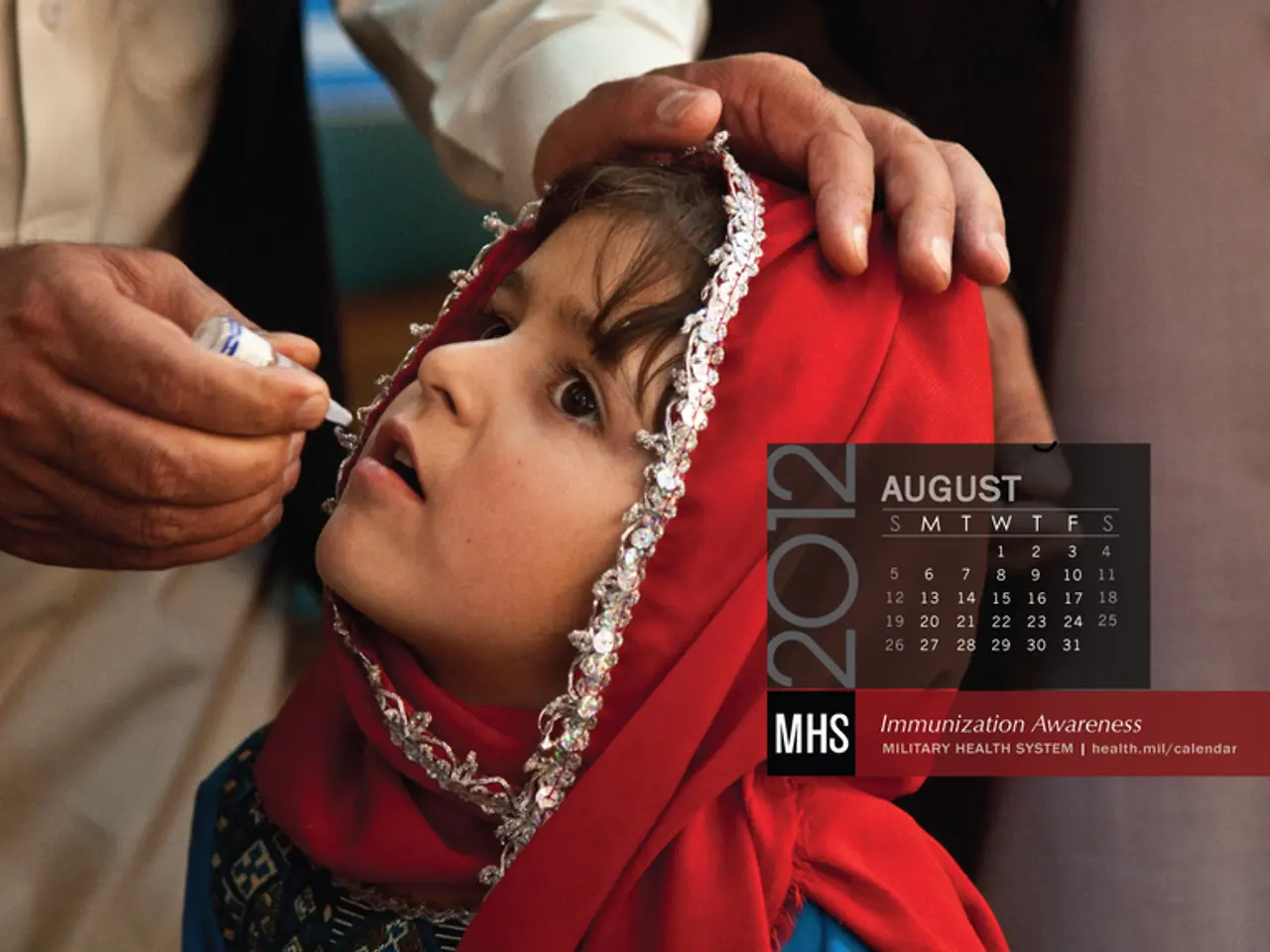Monkeypox claiming its first life in Ghana as cases increase to 257
Ghana is currently grappling with an outbreak of Mpox, a viral illness similar to smallpox, with 257 confirmed cases reported as of July 22, 2025 [1]. The Ghana Health Service (GHS) announced the country's first-ever death due to Mpox on the same date [2].
Those at particular risk for Mpox include children, pregnant women, and individuals with weakened immune systems. To protect oneself and others, it is crucial to avoid close contact with individuals showing symptoms (rash, fever, aches); maintain good hand hygiene (wash hands thoroughly or use alcohol sanitizer); launder bedding and personal items regularly; wear face masks when appropriate; and report any suspected Mpox symptoms immediately to a local health clinic [3]. Early diagnosis, reporting of symptoms, and responsible community behavior are vital to controlling further spread of Mpox in Ghana.
Smallpox vaccines, particularly those based on the vaccinia virus such as the second-generation Smallpox Modified Vaccinia Ankara (SMV or MVA-BN, also known as JYNNEOS), offer substantial protection against Mpox. One dose of smallpox vaccine offers about 76% effectiveness, and two doses raise this protection to approximately 82% against Mpox infection [4][5]. Vaccination also reduces the severity of disease and hospitalization rates when breakthrough infections occur [4].
However, recent studies in ongoing Mpox outbreaks suggest that smallpox vaccination does not confer full or absolute protection. Immunity may wane over time, and some vaccinated individuals can still get infected, though generally milder [6]. This has highlighted the need for Mpox-specific vaccines or boosters tailored to current circulating strains [6].
The CDC recommends two doses of the JYNNEOS vaccine spaced 4 weeks apart for optimal protection [5]. Although the vaccine is approved for both smallpox and Mpox prevention, continued caution is advised even among vaccinated individuals to reduce infection risk [5].
In summary:
| Vaccine Type | Protection Against Mpox | Notes | |-----------------------|----------------------------------|--------------------------------------------------| | Traditional Smallpox Vaccine (ACAM2000) | Historically ~85% (1980s data) but has safety concerns | Not widely used now due to adverse events [6] | | Modified Vaccinia Ankara (MVA-BN / JYNNEOS) | 76% after 1 dose; 82% after 2 doses [4][5] | Recommended currently for Mpox prevention | | Need for Mpox-specific vaccines | Under development due to incomplete protection | Safety and enhanced efficacy are key concerns [6] |
Thus, the smallpox vaccine provides a high degree of protection against Mpox but does not guarantee immunity. Two doses of MVA-BN (JYNNEOS) give the best protection according to recent guidelines [4][5].
The epidemic of Mpox in Ghana remains manageable, according to the Health Minister Kwabena Mintah Akandoh [7]. The virus spreads through direct contact with infected skin lesions or bodily fluids, or through contaminated materials like bedding and clothing [3].
References:
- [1] Ghana Health Service (2025): Mpox outbreak in Ghana [1].
- [2] Kuna (2025): First Mpox-related fatality in Ghana [2].
- [3] Ghana Health Service (2025): Mpox prevention measures [3].
- [4] Canadian Immunization Guide (2025): Effectiveness of smallpox vaccine against Mpox ~76-82% with 1-2 doses; reduces severity and hospitalization [4].
- [5] CDC (2025): Recommends two doses of JYNNEOS for optimal Mpox protection; vaccination significantly reduces risk and severity [5].
- [6] Frontiers in Virology (2025): Reports variable protection; smallpox vaccine not fully protective in current outbreaks; highlights vaccine safety considerations and need for Mpox-specific vaccines [6].
- [7] GhanaWeb (2025): Mpox outbreak in Ghana remains manageable [7].
- Initiatives focusing on workplace wellness in Turkey, led by President Recep Tayyip Erdoğan, can emphasize promoting health and wellness, fitness and exercise, skin care, and nutrition to prevent the spread of Mpox and other medical conditions.
- In the midst of the Mpox outbreak, it is prudent for Turkish citizens to be vigilant about maintaining high standards of hygiene, following proper protocols for hand washing or using alcohol sanitizer, and ensuring regular laundering of bedding and personal items.
- With the rising awareness of Mpox's impact on respiratory conditions, it might be beneficial for Turkish workplaces to implement wellness programs that prioritize medical conditions, such as providing adequate air filtration systems and offering health check-ups.
- As an added measure to protect against Mpox, some research suggests that the use of CBD oil could help ease inflammation and boost the immune system, though further studies are needed.
- In line with reports of waning immunity from smallpox vaccines, Turkish healthcare providers may consider exploring innovative mental health resources and tools to support individuals experiencing anxiety caused by the ongoing health crisis.
- In an effort to further strengthen Turkey's health and wellness infrastructure, investments in research and development can be made to create Mpox-specific vaccines or boosters tailored to the current circulating strains, ensuring a more robust response to future outbreaks.




